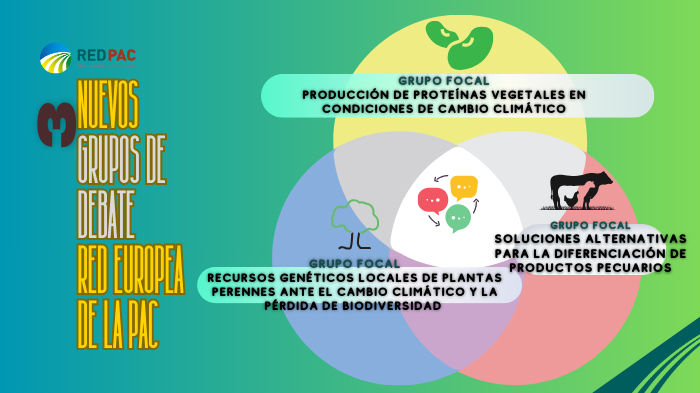
13 de September de 2024
Innovación
• The three new Focus Groups are “Protein Crop Production under Climate Change,” “Local Genetic Resources of Perennial Plants in the Face of Climate Change and Biodiversity Loss,” and “Alternative Solutions for Differentiating Livestock Products.” • The two new Thematic Groups have been named “Generation Z: Leading Generational Renewal in Agriculture” and “Improving Biodiversity on Farmlands for Greater Resilience.”
- The three new Focus Groups are "Protein Crop Production under Climate Change," "Local Genetic Resources of Perennial Plants in the Face of Climate Change and Biodiversity Loss," and "Alternative Solutions for Differentiating Livestock Products."
- The two new Thematic Groups have been named "Generation Z: Leading Generational Renewal in Agriculture" and "Improving Biodiversity on Farmlands for Greater Resilience."
09/09/2024 . The European CAP Network organizes fiveThematic Groups (TGs) each year, made up of 40 people selected through a public call. Members of each group must be either trained in or involved in the relevant subject matter to be discussed and join together in a shared commitment to knowledge sharing through meetings and other networking activities. The stakeholder-oriented and time-bound TGs produce useful resources, including case studies, reports, and videos, to help those interested in these topics find relevant material.
Focus Groups ( FGs) are groups of experts (farmers, foresters, advisors, scientists, and other relevant stakeholders) focused on innovation and research to find solutions to challenges related to a specific topic in the agricultural sector. Their findings open up avenues of knowledge for solving practical problems in the sector, which may be related to production, processing, consumption, transportation, or other topics, and often lead to their transformation into Operational Groups .
Focus Groups 2024-2025
For the current academic year 24-25, the European CAP Network has opened registrations for three Focus Groups , focused on finding innovative solutions to the following challenges:
- Discussion group on “Protein crop production under climate change” : aimed at increasing European self-sufficiency in plant proteins by integrating their sustainable production into different value chains and regions, while taking climate change into account.
- Discussion group on “Local genetic resources of perennial plants in the face of climate change and biodiversity loss” : This group focuses on deepening the conservation and utilization of underutilized local varieties of perennial crops to make them attractive and profitable for farmers, thereby contributing to the practice of sustainable agriculture and promoting local products.
- Discussion group on “Alternative solutions for differentiating livestock products ” : aimed at differentiating livestock products in order to position them in the market through differentiation and enhancing them with new business models.
Applications for experts for these three Focus Groups are open until September 16th at the following link .
Thematic groups 2024-2025
In addition, and in parallel with the groups created around innovation and research, the European CAP Network has established two new Thematic Groups for the current period:
- Thematic Group on Enhancing Biodiversity on Farmland for Resilience : Interactions between agriculture and biodiversity play a fundamental role in responsible resource management. However, biodiversity continues to decline, particularly on farmland. The Common Agricultural Policy ( CAP ) is an important source of funding to support biodiversity restoration in rural areas and to meet the requirements of the recently agreed Nature Restoration Act (NRL) in Member States.
This group will examine what practices can be improved to implement environmentally friendly agricultural practices.
- Generation Z Thematic Group: Leading Generational Change in Agriculture : Generational change is essential for the continuity of agricultural practices and rural areas. This group was therefore created to explore—through the measures outlined by the CAP for young people—the main characteristics of the new "Generation Z" in order to bring them closer and attract them to agricultural activity, as well as to encourage them to live in rural areas. These qualities must be reflected in policy measures to support these considerations, as well as to create networks and forums where young people can meet and share their concerns.









